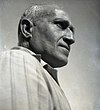Wikipedia:GLAM/National Library of Israel
| Main page | Schwadron collection | Manuscripts collection | Maps collection | Library related | Events | Results |
|
Welcome to the National Library of Israel (NLI) GLAM project! On December 2011 the Library and Wikimedia Israel launched the second GLAM project in Israel. Following the recent success of the GLAM: Israel Museum project and the recent Wikimania Haifa 2011, the project was launched with high hopes. Directing the project are Ido Ivri, Manager of Digital Programs in the library, Shani Evenstein, Wikimedia Israel's Glam Projects Coordinator, GoalseditOn the NLI's sideedit
On the Wikimedia community's sideedit
How can I help?editGlad you asked! Here's a short list, but please be imaginative and contribute in ways we haven't thought of.
ScopeeditThe scope of the project includes any material housed by the library, which can be used to enrich Wikipedia and its sister projects.
The Schwadron collectionedit The Schwadron collection, begun as a private collection by Avraham Schwadron, who later donated it to the library, and became its curator, in charge of its continuing expansion contains thousands of portraits and autographs. The collection focuses on people of Jewish descent – of all walks of life – scientists, statesmen, rabbis, poets, journalists, etc. The current project is based on the portrait collection, and we like to focus especially on those people who missed the proliferation of the internet by a year or two (or a few centuries) and simply don’t have free images available online – till now. The manuscript collectioneditExperts estimate that about 90,000 manuscripts have been written in the Hebrew language. The National Library (NLI) collection includes ~8,000 of them, along with ~2,500 manuscripts in the Arabic language and ~800 in other languages. In addition to the physical manuscripts, since the 1950s the NLI has been operating the Institute for the Photography of Hebrew Manuscripts. The institute collects microfilm copies of manuscripts found in other collections across the world, both private and public. The institute currently has over 76,000 microfilm reels and thousands of digital scans, which comprise over 90% of the known Hebrew manuscripts in the world. All of these are available for perusal to researches and other interested parties. Among the most important manuscripts found in the NLI are: Maimonides's original Mishnah commentary, theological manuscripts by Isaac Newton and dozens of rare significant Muslim works. The cartographic collectioneditThe cartographic collection, one of the most important such collections in the world, includes ancient maps (from the 15th Century onward), ancient atlases, historical books on geography, holy books and non-fiction books featuring maps. Along with ancient maps of various places in the world, the core of the collection consists of about 1,500 ancient maps of Jerusalem and the Land of Israel, as well as modern maps of Israel and its cities before and after the founding of the state. The collection also includes 56 ancient maps of Persia, the earliest dating back to 1486, and 17 original maps by the cartographer Abraham Jacob Brawer. Find out moreeditIf you are a Wikipedia editor, please feel free to ask questions on the talk page of this project page. If you are not a Wikipedia editor, and/or are unfamiliar with Wikipedia's interface (yet :) ), please feel free to contact us at: wiki.glam.il ParticipateeditIf you are interested in participating in the project, please add your name below |